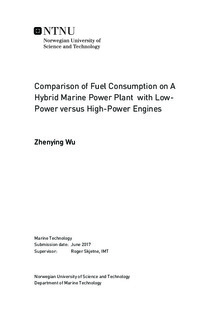Comparison of Fuel Consumption on A Hybrid Marine Power Plant with Low-Power versus High-Power Engines
Master thesis
Date
2017Metadata
Show full item recordCollections
- Institutt for marin teknikk [3397]
Abstract
Due to operation cost and environmental concerns, there is ongoing effort to reduce the fuel consumption and emissions in all transportation sectors including marine transportation. In the last decade, the development of diesel electric propulsion system have made it possible to be installed on many offshore installation vessels. Electric propulsion installation becomes a prevailing trend mainly due to increased demands for energy-efficient and low emission vessels with high availability and reliability. Combining gensets with ESD has shown through different usage strategies to have a potential for improving the fuel economy as well as enhancing the genset dynamics which reduces fuel consumption, emissions, wear and tear, and maintenance cost.This thesis has presented optimization methods to find optimal operating point for gensets under different power demands, with regard to fuel consumption and NOx emission. Three power system configurations for an offshore construction vessel will be explored in this study, 1) marine power plant with large gensets, 2)marine power plant with small gensets which has the same cylinder characteristic with 1), and 3) marine power plant with small gensets which has different cylinder characteristic with 1) and 2).Optimization simulations were accomplished in Matlab. A typical power demand step-wise from 10% to 100% MCR has been tested in all configurations, and results have illustrated good fuel economy in configuration 2 over configuration 1. Fuel consumption was also high in configuration 3, however, it was caused by its higher optimum specific fuel consumption feature. Monte Carlo method was applied to test the sensitivity of cost function with slightly varying optimum engine operating points for one case, where it gave consistent fuel consumption and has shown the validity of optimization results. Considering AC/DC converter efficiency degrades especially at low load percentage, a study has shown that fuel efficiency is even better in configuration 2 than one in configuration 1. Multi-objective simulations on configuration 2 was presented with 3 different load condition, 20%, 45% and 70%. It illustrates different shape of pareto front, which is a group of non-dominating optimums. Generally, it showed that in order to reduce the NOx emission, fuel consumption is required to be compromised. Due to the limitation of accessible specific NOx map, limited case study was accomplished. However, the same optimization method can apply to these maps when it is accessible.Besides, results have indicated by integrating ESD led to fuel consumption by 5.9%, 4.8% and 6.7% in configuration 1, 2 and 3 respectively. Furthermore, configuration 1 has shown a lower fuel consumption by 6.5% and 12.7% before using ESD, and 4.9%, while 10.9% after integrating ESD during a certain operational profile. The fuel saving potential was proved to be larger in low-power engine configuration for an assumed offshore construction vessel. The performance of the proposed technique was validated through simulation results, and its advantages were demonstrated.
